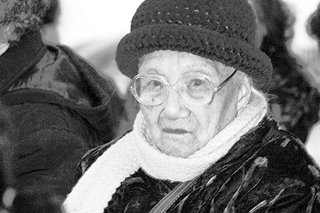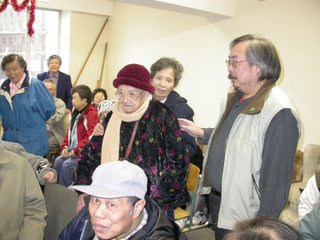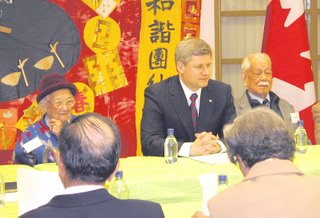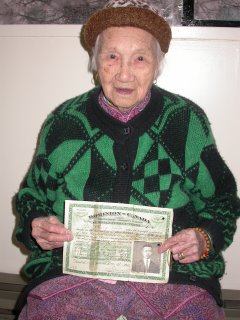Ralph Lee, 107, was oldest to pay head tax – passes away 5 days after receiving cheque
Ralph Kung Kee Lee
passed away only five days after receiving his ex-gratia payment from
the Canadian government. In 2006, Lee was the oldest activist
asking the government to make a sympbolic return of head tax money
charged only to immigrants of Chinese ancestry. It seemed like
only days ago, that the Conservative government had a photo op with Mr.
Lee.
Unfortunately the same cannot be said for Mrs. Der – the
oldest living head tax spouse who passed away in Vancouver on Friday
evening. Back in December 2005, the 101-year old Mrs. Der climbed
2 flights of stairs to attend a meeting organized by the BC Coalition
of Head Tax Payers, Spouses and Families. In early 2006, Mrs. Der
met with both MP Jason Kenney, and Prime Minister Steven Harper – who
both promised her quick action for giving immediate symbolic
repayment for surviving head tax payers and spouses.
Due to poor heath on June 22, 2006. Mrs. Der was unable to attend the
ceremonies at the Vancouver Hotel, for the simulcast apology
announcement by Prime Minister Harper. Mrs. Der was also unable
to attend the Oct ceremony of the first head tax ex-gratia payment
given to Charlie Quon in Vancouver.
Below are stories about Ralph Lee from the media.
Chinese immigrant, 107, was oldest to pay head tax
Last Updated: Monday, March 19, 2007 | 5:29 PM ET
Three generations of Ralph Lung Kee Lee's family gathered
for a memorial in Toronto Monday to say goodbye to the oldest member of
the Chinese-Canadian community to have paid the head tax.
Lee died at his residence in Pickering, Ont., on
Thursday, five days after celebrating his 107th birthday.
 Ralph Lee, at 106, carrying the symbolic 'last spike'
Ralph Lee, at 106, carrying the symbolic 'last spike'
used in the completion of the Canadian Pacific Railway, arrives in
Ottawa aboard the 'Redress
Express' in 2006.
(Canadian Press)
“I'll miss him being around in terms of honouring
our ancestors, having the traditions passed down through the community,”
his granddaughter Lindy Anderson
said, fighting back tears.
Born March 10, 1900 in China's Guangdong province, he
immigrated to Canada at the age of 12 and moved to the northern Ontario
community then known as Fort William, now the city of Thunder Bay.
He spent five years working as a dishwasher there in order to pay off the $500
head tax he was forced to pay upon entering
Canada .
All Chinese immigrants entering
Canada from 1885 to 1923 had a head
tax imposed on them, with the intention of deterring Chinese immigration after
Chinese workers helped build the Canadian Pacific Railway in 1885.
A symbol of community's history
Lee later worked at maintaining the railway a previous
generation of Chinese labourers had helped to build.
To many in the Chinese-Canadian
community, Lee represents the history of Chinese immigration to this
country, said Colleen Hua, president of the Chinese Canadian National Council.
“What they see him as symbolizing is a person who,
although excluded, still persevered and worked through it and lived to the very
end to make sure that he saw an end to the exclusion and the redress,” Hua
said.
Lee returned to China
and found a wife before returning to
Canada .
But because the Chinese Exclusion Act prohibited Chinese
immigrants from bringing their families to
Canada , Lee's wife and son were
unable to join him. By the time the act was lifted in 1947, his son had died
during the Second World War.
Eventually, his wife and two daughters were brought to
Canada
to live with him.
Lee later started his own business importing and exporting
goods from China .
Joined 'Redress Express' journey
He participated in another historic chapter for the
Chinese-Canadian community when he was one of several head-taxpayers who
travelled to Ottawa from
Vancouver in 2006 on a train dubbed the
“Redress Express.”
At the end of the journey on June 21, Prime Minister
Stephen Harper formally apologized for the fact that the head tax had been
imposed and promised symbolic payments to those who were affected.
Lee, who was 106 at the time, carried the symbolic
“last spike” given to the Chinese community by author Pierre Berton
in recognition of work done by immigrants to build the railway.
He is survived by two daughters, seven grandchildren and
12 great-grandchildren.
Of an estimated 80,000 Chinese immigrants who paid the
tax, about 30 remain alive, as well as several hundred widows of men who paid
the tax.
http://www.cbc.ca/canada/toronto/story/2007/03/19/headtax-obit.html
Family hopes memory and legacy of centenarian
head-tax payer lives on
|
|
|
Allison Jones
|
|
Canadian Press
|
Monday, March 19, 2007
TORONTO (CP) –
Ralph Lung Kee Lee has earned a place in Canadian history books as the oldest
Chinese head-tax payer to accept the government's official apology and redress,
and his family said Monday at his memorial service they hope his story lives on
long after his death.
Lee
received his $20,000 redress cheque from Ottawa
on March 10, his 107th birthday – just five days before he died.
“It
was almost like, 'I waited this long, here I am. I'm going to stay alive to get
it,”' Lee's daughter Linda Ing said of her father, who received his
apology and compensation 94 years after coming to Canada.
Born
in 1900, Lee came to Canada
when he was 12 and paid the $500 head tax imposed on all Chinese immigrants
between 1885 and 1923.
He
returned to China to marry
and fathered three children, but the Exclusion Act prevented him from bringing
his family to Canada .
After
the Exclusion Act was lifted in 1947, Lee was finally able to reunite with his
family in Canada .
For Ing, who was then 12, it was the first time she had ever laid eyes on her
father.
On
June 22, Lee was the oldest of six surviving head-tax payers who saw Prime
Minister Stephen Harper deliver the government's official apology.
Lee
had a fun and loving personality, Ing said, and he was quite tickled when he
finally received his redress cheque.
“I
said, 'You're going to be 107,”' Ing recalled telling her father the day
before his birthday.
“He
said, 'Me?' I said, 'You,”' Ing said in mock wide-eyed amazement.
“'You're going to get your cheque.' And he just laughed.”
Ing
said when she was younger, she didn't appreciate the sacrifices her father
made.
“It
was in one ear and out the other,” she said.
Ing's
son Leo said now that Lee is gone, it's important for those who remember his
story to pass it on so his legacy never dies.
“As
we move on, the younger generation has to look back and to look at people like
grandpa and think (about) why we came here, what we've accomplished here,”
he said.
“One
day I won't be here to speak, so I want to make sure that grandpa has passed
the torch on to the younger generation. I want the younger generation to
realize where they came from, to be proud to be Chinese.”
Lee's
granddaughter Landy Anderson said she is extremely proud to tell people about
her grandfather and her connection to Canadian history.
“It's
really hard to talk about grandpa without referring to the head tax, since my
entire family history revolves around this event,” she said, adding even
though Lee had to overcome years of adversity and racism, he was a loving soul
who doted on his family.
Lee
is survived by two daughters, seven grandchildren and 12 great-grandchildren.
© The
Canadian Press 2007
http://www.canada.com/topics/news/national/story.html?id=4b839cd4-e837-4ecf-89e9-8b999df7d253&k=66676
******************************
Victor Wong
CCNC Executive Director
national@ccnc.ca
(416) 977-9871 (tel)
(416) 977-1630 (fax)
CCNC: www.ccnc.ca
PanAsian Network: www.ccnc.ca/panasian
Health Equity Network: www.ccnc.ca/health
“Remembering the contributions of the Head
Tax payers, Chinese railway workers and their families.”






 Bill Wong carving a dragon boat head with his grandchildren – photo Todd Wong
Bill Wong carving a dragon boat head with his grandchildren – photo Todd Wong




